Top 10 Political Slogans That Became Memorable (For All the Wrong Reasons)
The campaign slogan should be memorable, but not for all the wrong reasons. Accidental insinuations, well-intentioned threats, depraved invitations and simple ... read more...indifference by the elderly are all attempted in the pursuit of political power. Check out the list of top 10 political slogans that became memorable (for all the wrong reasons).
-
In 2010, war criminal Charles Taylor was convicted for his role in establishing the Revolutionary United Front, a guerilla army in Sierra Leone renowned for chopping off people's limbs. Taylor had also invaded Liberia in 1989 to depose the dictator Samuel Doe. The struggle lasted seven years and cost the lives of an estimated 200,000 civilians, many of whom were taken by Taylor's child soldiers.
Following a cease-fire in 1997, the US encouraged Taylor to run in elections as a viable path to the presidency. Children were among his most ardent followers, chanting, "he killed my mother, he killed my father, but I will vote for him." However, the majority of voters were terrified. They were extremely fatigued and couldn't bear the thought of the fight continuing. Another of his catchphrases, "better the devil you know," refers to Taylor's image. According to The New Yorker's Jon Lee Anderson, Liberians perceived him as "a kind of Nosferatu who needed to be appeased." He's even said to have kept a bucket of human blood next to his bed, replenished daily. He received 75% of the vote. And, indeed, there was another civil war in which more people died. Taylor was finally removed from office in 2003.
Some information about Charles Taylor:
- Born: 28 January 1948 (Arthington, Montserrado County, Liberia)
- Presidential term: August 2, 1997 – August 11, 2003

guardian.ng -
“I’m not a witch, I’m you” ranks 2nd in the list of political slogans that became memorable. Tea Party candidate Christine O'Donnell used her run for the Delaware Senate to address reports that she dabbled in witchcraft, which is a big no-no among her right-wing religious support base. "I'm not a witch," she claimed in her campaign video, before instantly contradicting herself with the supernatural qualifier: "I'm you." She'd simply dabbled; she'd never joined a coven; she'd always made it clear. And, despite the fact that one of her "first dates with a witch was on a satanic altar, a little blood there and stuff like that," she was not a witch.
Saturday Night Live satirized the bizarre video, which was nearly a parody in and of itself. "I'm not like you've heard," Kristen Wiig as O'Donnell explained, "I'm you." And, like you, I have to continuously deny being a witch." Wiig continued, in a dig to the Tea Party's backward-looking policies, "That's the kind of candidate Delaware hasn't had since 1692."
Some information about Christine O'Donnell:
- Born: : August 27, 1969 (Philadelphia, Pennsylvania, USA)
- Education: Fairleigh Dickinson University(BA)

delawareonline.com 
delawareonline.com -
Sole Sánchez Mohamed's tagline and accompanying photo, in which she posed topless with a man covering her nipples, garnered international headlines in 2011. Her breasts were essentially the platform she was campaigning on - her "two main arguments." She considered that these qualifications prepared her for the position of mayor of Ciutadella, Menorca. She also appeared in a local magazine wearing nothing but lingerie and looked subservient as part of her marketing.
Needless to say, she had her detractors. Esquerra de Menorca, a rival party, alleged Sánchez Mohamed's campaigning was sexist and exploitative. They said in their complaint to the Institut de la Dona (Women's Institute) that it was a "affront to the dignity of women and the public in general."
The response of the future mayoress was contemptuous. "No one is more feminist than me," she continued, channeling Donald Trump. Individuals are free to express themselves in whichever way they see fit, and I use my breasts and body in whatever way I see fit." "If all they can do is watch," she continued, "that is their fault."
Some information about Sole Sánchez Mohamed:
- A political candidate for her party on the island of Minorca

tagesschau.de 
tagesschau.de -
Everardo Oliveira, a former circus clown known as Tiririca ("Grumpy"), was elected a federal lawmaker for Sao Paulo with an astounding 1.3 million votes in 2010. In an election marked by irreverence and celebrity contenders, he was by far the most popular candidate. Romario and Bebeto, both World Cup '94 footballers, were also elected to government roles. Brazilians have apparently had enough of career politicians and professional lying.
Grumpy's marketing was endearingly populist, with hilarious viral YouTube ads. In one, he inquired, "What exactly does a federal deputy do?"." Grumpy had entered the circus as a destitute eight-year-old with little knowledge of national politics. Indeed, after his victory, publications said he couldn't read or write, forcing him to show his literacy in order to preserve his seat.
He was ultimately the one who rejected the establishment. Following his reelection in 2014, he refused to run again, claiming he had lost respect for politics. Only eight of the 513 legislators paid to sit in the lower house of congress did so on a regular basis, according to Grumpy. "I'm one of those eight, and I'm a circus clown," he continued regretfully.
Some information about Everardo Oliveira:
- Nickname: Tiririca
- A federal lawmaker for Sao Paulo
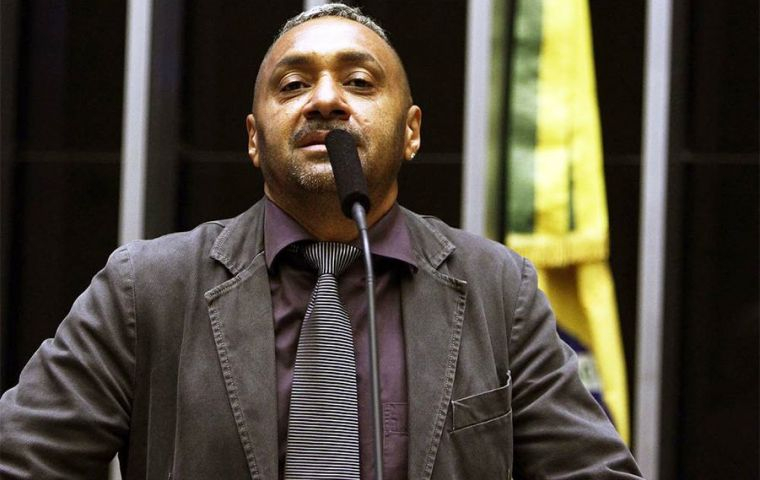
en.mercopress.com 
en.mercopress.com - Nickname: Tiririca
-
“One more heave” ranks 5th in the list of political slogans that became memorable. Jeremy Thorpe, a British politician, had lofty goals. He was elected president of the Liberal Club, the Law Society, and the Oxford Union as an undergraduate at Oxford. However, there were allegations of vote tampering even back then. Despite this, he was likable on the campaign trail, noted for his progressive ideas and sporting a brown derby hat inspired by New York governor Alfred Smith. In 1974, his motto, "One more heave," alludes to group effort. However, given that this was his first bid for Prime Minister, it may be interpreted as a personal motto - one more heave to achieve the top post in Westminster.
Unfortunately, it also connotes vomiting. Given Thorpe's involvement in the attempted murder of an alleged gay lover called Norman Scott, as well as the real death of Scott's pet dog, the case takes on a darker tone. Thorpe, who was outspoken (in private) about his homosexuality, allegedly sought to quiet Scott in order to remove any impediments to power. Instead, the incident effectively killed his career and ruined his character.
Some information about Jeremy Thorpe:
- Born: April 29, 1929, Surrey, United Kingdom
- Date of death: December 4, 2014, London, UK
- Former Member of Parliament of the United Kingdom of Great Britain and Northern Ireland

somersetcountygazette.co.uk 
somersetcountygazette.co.uk -
In 1928, New York governor Alfred E. Smith was the first Catholic presidential candidate from one of the two major parties, running for the Democrats. Needless to say, this provided his opponents, including the Ku Klux Klan, with plenty of ammunition. They claimed Smith was a tool of the Pope in Rome and an enemy of religious freedom in the United States, particularly Protestant, i.e. "American" freedom. They also said he would invalidate all Protestant marriages, effectively branding millions of fine, honest American children as "bastards."
Even more ridiculous, a story spread that the freshly finished Holland Tunnel was designed as a secret passage between the Vatican and New York City. It was stated that once his minion was elected, the Pope would have easy access to America. Worse, in addition to his Catholicism, his anti-Prohibition (i.e. "Wet") program was related to the Irish caricature - drunks in the gutters and so on. As Governor of New York, he had already authorized weak beers on licensed premises in the city and later decriminalized booze, so people knew he was serious. In the end, he lost to Klan favorite Herbert Hoover, thanks to this poor slogan. And, yeah, it meant the same thing back then as it does now.
Some information about Alfred Emanuel Smith:
- Born: December 30, 1873, New York City, New York State, USA
- Date of death: October 4, 1944, New York City, New York State, USA
- Education: St. James Elementary School
- Former Governor of New York
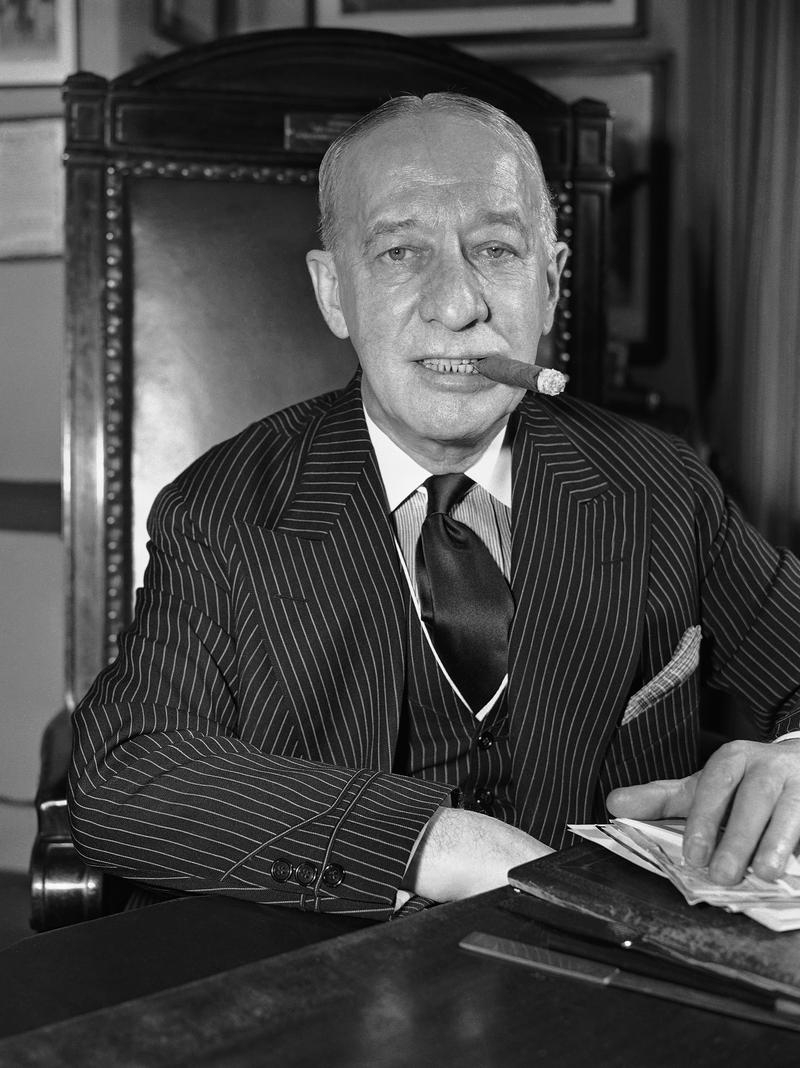
.rd.com 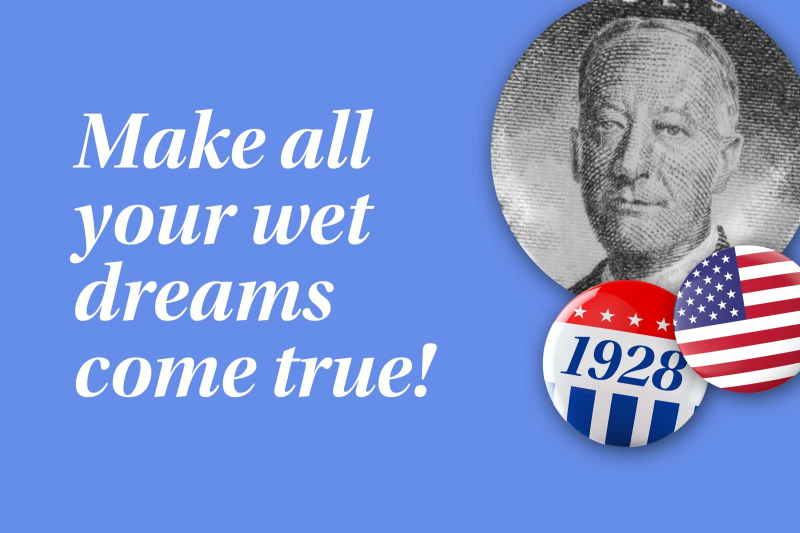
rd.com -
Campaigning was something William Taft despised. He preferred to spend his time on the golf course, believing that the voters detested him. This tagline encapsulates his mentality. It betrays not only his laziness (wanting to be left in "the chair") but also his sense of entitlement in its disinterest. It's all about his right to govern over his nation, not about anything else.
At first look, it appears to be an odd choice of slogan. However, the political backdrop of 1912 explains why someone (either Taft or someone on his campaign crew) believed this phrase made sense. Taft was the incumbent, having won in 1908 with the help of popular Teddy Roosevelt. Roosevelt, on the other hand, was running against him for a third term as a candidate for the Progressive or "Bull Moose" party. As a result, Taft's tagline represented his chances of victory. His reservations were well-founded. For the Democrats, Woodrow Wilson won the presidency, with Roosevelt finishing second. Taft finished third with only 23% of the vote.
Some information about William Howard Taft:
- Born: September 15, 1857, Cincinnati, Ohio, USA
- Date of death: March 8, 1930, Washington, D.C., USA
- 27th President of the United States of America
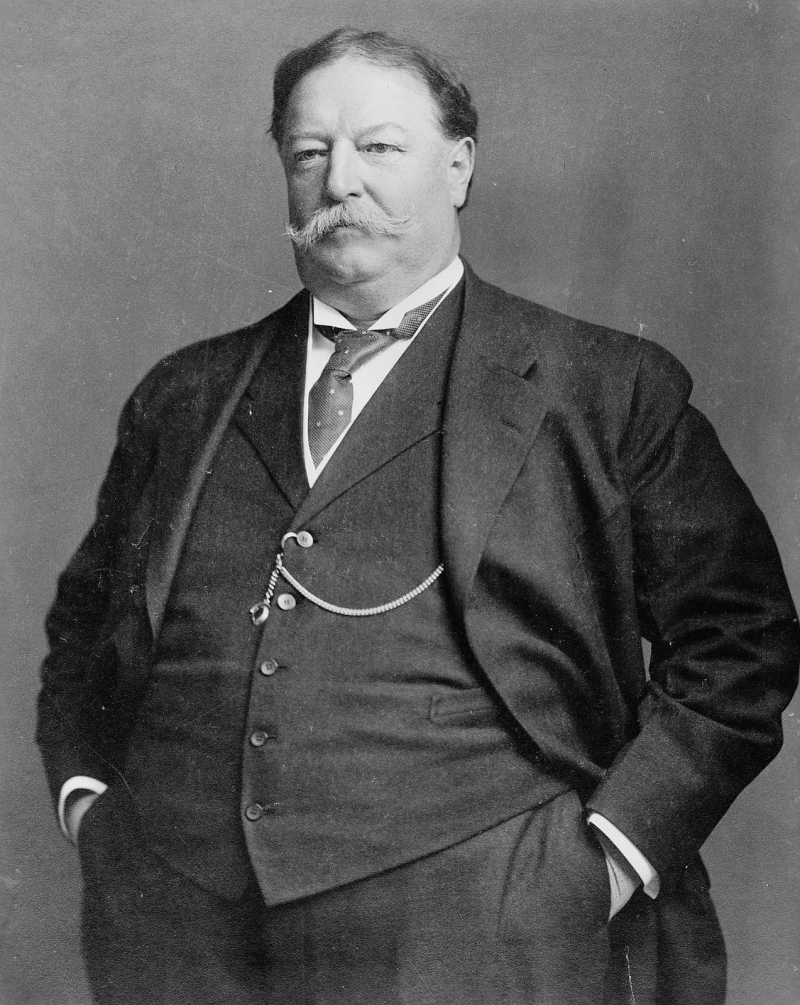
britannica.com 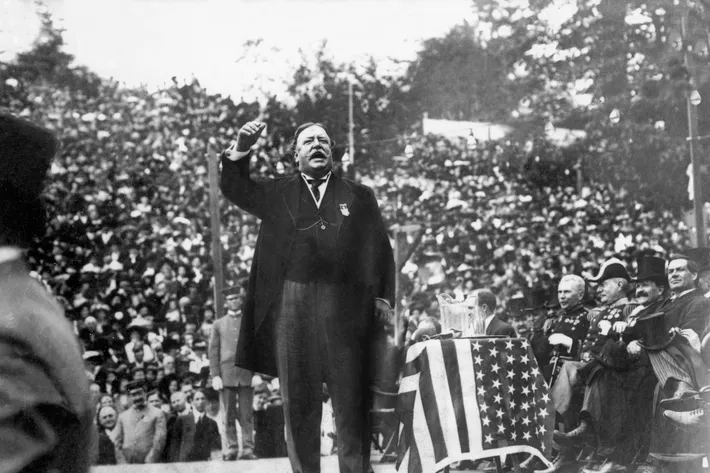
nymag.com -
On April 6, 1917 (95 years ago today), President Woodrow Wilson received approval from both houses of Congress to enter the First World War, which he had requested four days earlier on April 2nd. It was ironic, given that Wilson had gained re-election just five months before on the promise of "keeping us out of war." Wilson became popular and was re-elected, thanks in part to this strong slogan. Keeping America out of World War One during his first administration was no small feat. He was pro-military readiness and neutrality over armed confrontation, according to his propagandists, having grown up during the Civil War and witnessed the horrors of battle.
His Republican opponent, Charles Hughes, was understandably critical, but Wilson prevailed by nearly 600,000 votes. His anti-war position was popular with voters. So, what makes this slogan unsuitable? Within five months of being re-elected, Wilson led America to war, dispatching American troops to distant European battlefields. According to supporters, Germany forced him to choose. However, the move helped to further his concept of "a universal association of nations," which he submitted to Congress in 1918.
Some information about Woodrow Wilson:- Born: December 28, 1856, Staunton, Virginia, USA
- Date of death: February 3, 1924
- 28th President of the United States
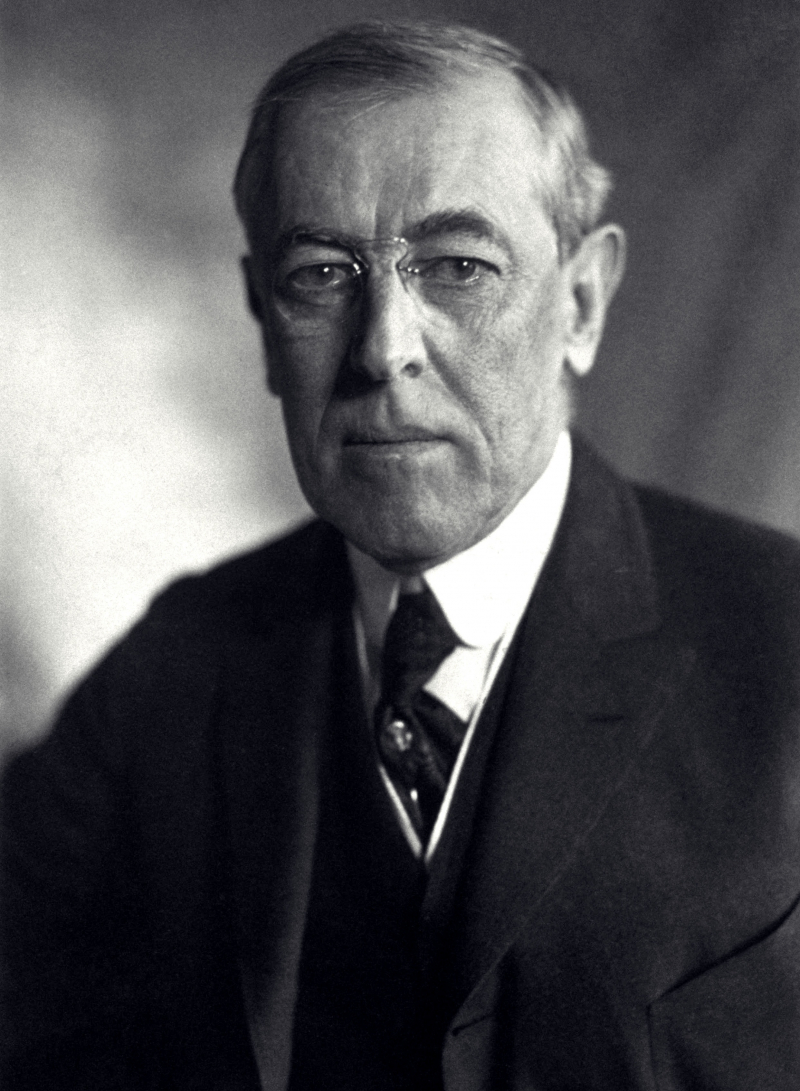
potus-geeks.livejournal.com 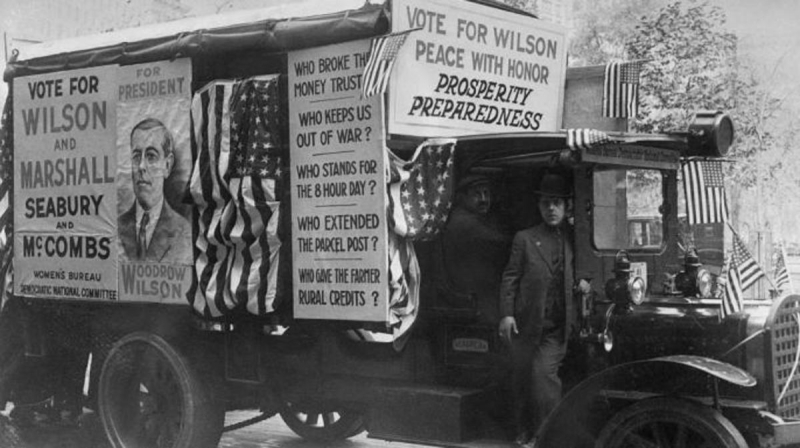
potus-geeks.livejournal.com -
FDR supporters tended to use catchphrases only to mock those of the Willkie campaign, as in “Better a Third Termer than a Third Rater.” Given that Franklin Delano Roosevelt ran for president—and won—four times, he had his fair share of campaign slogans, but official (like “Happy Days Are Here Again”) and unofficial. One of the catchiest slogans to appear on a campaign button came during the 1940 election, and read: “Better a Third Termer Than a Third Rater.”
This wasn’t the work of a politically savvy wordsmith: it was actually a statement made by Senator Henry Ashurst, a Democrat from Arizona regarding his feelings on voting for the Republican candidate, Wendell Willkie, in the presidential election. Though Ashurst and FDR were from the same party, the senator previously backed a proposed constitutional amendment which would limit presidents to serving one six-year term. Even though being reelected in 1940 would put Roosevelt in his third term, Ashurst uttered the words that became a campaign slogan when faced with the political alternative.
Some information about Franklin Delano Roosevelt:
- Born: January 30, 1882, Hyde Park, New York State, USA
- Date of death: April 12, 1945
- 32nd President of the United States of America
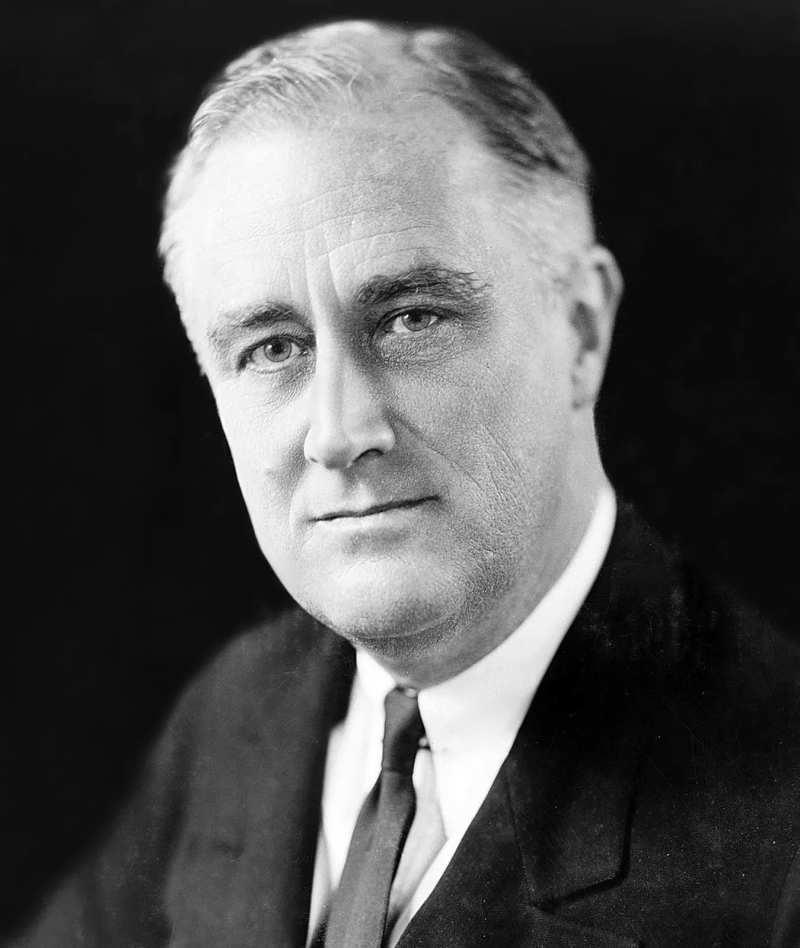
britannica.com 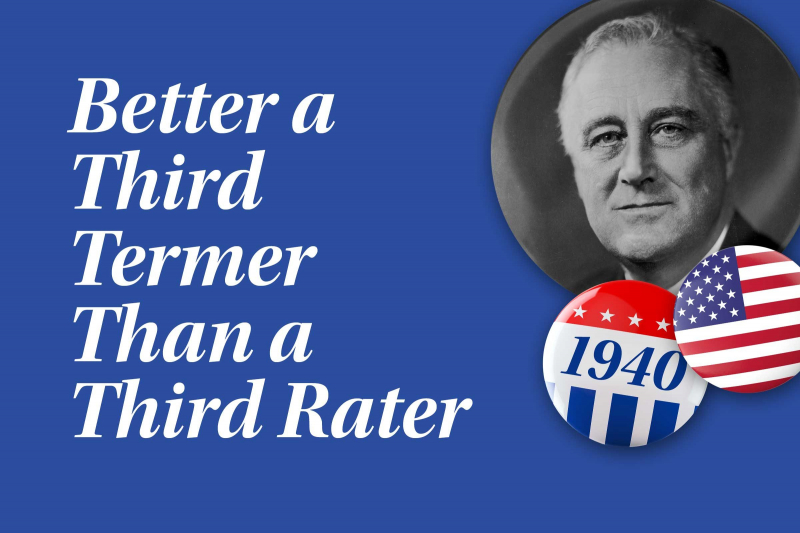
britannica.com -
Republican nominee Barry Goldwater was well-known for his tough anti-communist rhetoric and defended his "extremism" in his acceptance speech for the 1964 GOP presidential nomination. His campaign staff attempted to appeal to American voters' gut feelings with the phrase "In your heart, you know he's right."
The year after John F. Kennedy's killing, his vice president and predecessor, Lyndon B. Johnson, ran for president as the Democratic contender. His Republican opponent was Arizona Senator Barry Goldwater, who was widely regarded as a right-wing radical, even by members of his own party. Goldwater (or, at least, his campaign) loved gimmicky wordplay and products, such as buttons that read "Au H20" (Au = gold; H20 = water) and his slogan, "In Your Heart, You Know He's Right." And, according to Margaret Kaplan, an editorial assistant at Apollo Publishers who worked on Words to Win By, a book about campaign slogans, Goldwater was experimenting with five different slogans. “This one tested the worst out of all of them, but he was so committed to it,” she told The History Channel.
Some information about Franklin Delano Roosevelt:
- Born: January 2, 1909, Phoenix, Arizona, USA
- Date of death: May 29, 1998
- United States Air Force officer
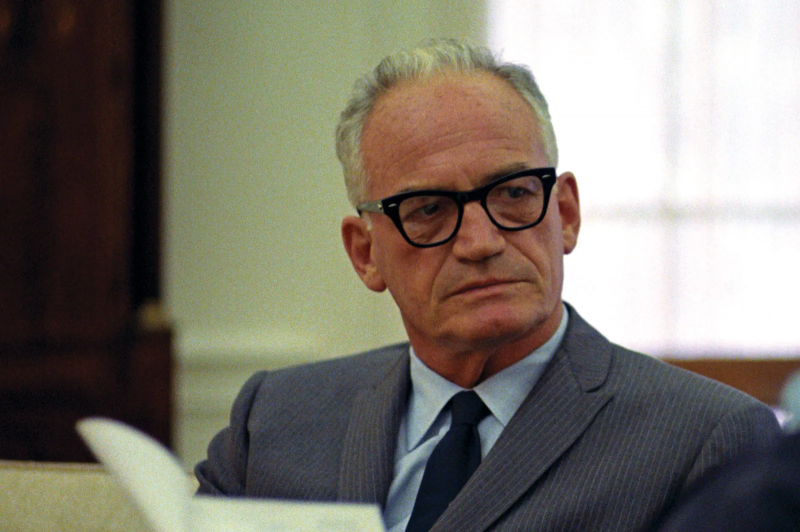
businessinsider.in 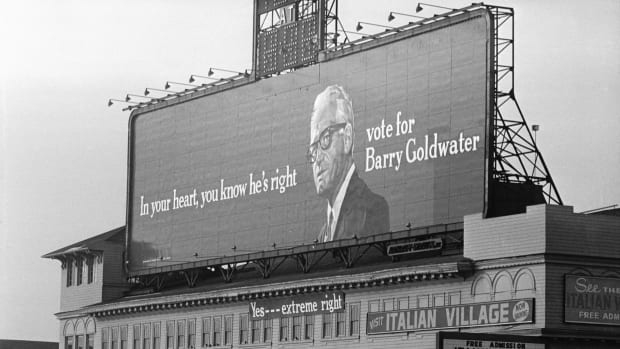
businessinsider.in































